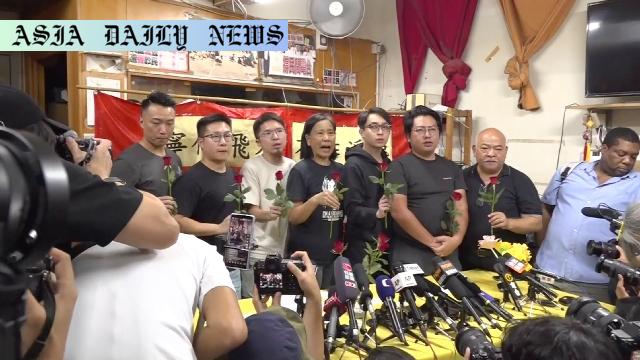National Security Law: Authorities arrest pro-democracy figures and dissolve groups in Hong Kong under immense pressure.
Key Point 1: Hong Kong National Security Law implemented five years ago to manage anti-government activity.
Key Point 2: Pro-democracy groups face dissolution under immense political pressure since the law’s enactment.
Key Point 3: Authorities arrested over 330 individuals, with more than 160 found guilty on national security charges.
Key Point 4: League of Social Democrats dissolves, marking a decline in pro-democracy voices in Hong Kong.

The Introduction of the Hong Kong National Security Law
Monday signifies the fifth anniversary since the introduction of the Hong Kong National Security Law, a legislation that has radically altered the political and social landscape of the territory. Enacted on June 30, 2020, the law was devised to suppress anti-government protests and neutralise what the authorities described as threats to national security. However, it has led to sharp criticism globally for undermining freedom of speech, democracy, and human rights.
Crackdown on Pro-Democracy Figures and Organizations
Over the past five years, the Hong Kong government has deployed the National Security Law to target individuals who advocate for democracy and challenge Beijing’s authority. More than 330 pro-democracy politicians, activists, and government critics have been arrested, with over 160 convictions. The measure has fostered an atmosphere of stifling fear and silenced political dissent in an unprecedented manner. Among the arrested are high-profile figures who showcase the depth of China's aim to suppress any opposing narrative.
The Gradual Decline of Pro-Democracy Groups
In a significant development on Sunday, the League of Social Democrats, a prominent voice advocating for worker rights and universal suffrage since its inception, announced its dissolution. Chair Chan Po-ying revealed that the group made the painful decision under intense political pressure, signifying the diminishing space for opposing opinions in Hong Kong. This dissolution follows the Democratic Party’s announcement in February to initiate disbanding procedures, further isolating voices supporting democracy in the territory.
Impact on Civil Liberties and Human Rights
The enactment of the National Security Law has drastically curtailed freedoms long enjoyed by Hong Kong residents. The media, civil society, and ordinary citizens tread carefully to avoid state scrutiny. Such a transformation marks a stark contrast to the vibrant, free-wheeling city Hong Kong represented just a decade ago. Subtle and overt pressures have crushed civil liberty, leaving a vacuum in public discourse and self-expression. Institutions are increasingly aligned with Beijing’s stringent political stance, leaving little room for liberties previously safeguarded under the ‘one country, two systems’ arrangement.
Reactions from the International Community
The enactment and enforcement of the security law did not go unnoticed among the international community, which has reacted strongly against these draconian measures. Governments, particularly in the West, have condemned the law, accusing China of violating its commitments outlined in the Sino-British Joint Declaration. Several countries have imposed sanctions targeting individuals and entities complicit in eroding Hong Kong’s freedoms, though these steps have done little to reverse the ground realities in the territory.
Conclusion: The Path Forward?
As the National Security Law hits its five-year mark, its implications continue to unfold, entrenching the ideological rift in Hong Kong. While the Chinese government sees this measure as essential for stability and governance, critics argue that it effectively dismantles Hong Kong’s democratic ideologies and freedoms. With virtually no active pro-democracy groups left in the territory, the future of Hong Kong’s socio-political environment remains uncertain. Bridging this ideological divide requires dialogue, transparency, and a willingness to safeguard human rights—a prospect that remains elusive.
Commentary
The Erosion of Hong Kong’s Democratic Ideals
The fifth anniversary of the National Security Law in Hong Kong is a somber reminder of how quickly democratic freedoms can erode under authoritarian control. The dissolution of notable pro-democracy groups, such as the League of Social Democrats, and the arrests of hundreds illustrate the comprehensive extent to which the Chinese government has sought to eliminate dissenting voices. For decades, Hong Kong stood as a beacon of freedom in Asia, but this legislation has fundamentally shifted its identity.
The Human Cost of Suppression
Beyond politics, the human cost of enforcing the National Security Law is devastating. Activists, once proud defenders of democratic values, now languish in prison or live in self-imposed exile. Families are separated, voices are silenced, and hopes are diminished. This suppression sends a chilling message globally about the cost of challenging authoritarian regimes. It also underscores the lengths to which such governments will go to maintain control, regardless of international backlash or internal dissent.
What the Future Holds
While Hong Kong’s future remains uncertain, one thing is clear: democracy, once lost, is incredibly hard to reclaim. With virtually all pro-democracy avenues shut or heavily regulated, the chances for meaningful reform seem bleak. Yet, history shows that resilience often emerges in the face of adversity. Movements for freedom and change may go underground, but they rarely disappear entirely. The international community must continue to stand in solidarity with Hong Kong, even when tangible outcomes appear distant. Such support is critical for keeping the spirit of democracy alive.


